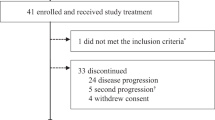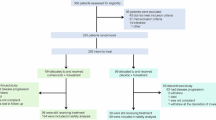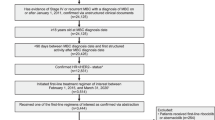Abstract
Blockade of the cyclin-dependent kinase 4 and 6 pathway has been shown to be effective in the treatment of hormone receptor-positive advanced breast cancer (ABC). We report the interim results of DAWNA-1 (NCT03927456), a double-blind, randomized, phase 3 trial of dalpiciclib (a new cyclin-dependent kinase 4 and 6 inhibitor) plus fulvestrant in hormone receptor-positive, HER2-negative ABC with disease progression after endocrine therapy. A total of 361 patients were randomized 2:1 to receive dalpiciclib plus fulvestrant or placebo plus fulvestrant. The study met the primary end point, showing significantly prolonged investigator-assessed progression-free survival with dalpiciclib plus fulvestrant versus placebo plus fulvestrant (median = 15.7, 95% confidence interval (CI) = 11.1–not reached versus 7.2, 95% CI = 5.6–9.2 months; hazard ratio = 0.42, 95% CI = 0.31–0.58; one-sided P < 0.0001 (boundary was P ≤ 0.008)). The most common grade 3 or 4 adverse events with dalpiciclib plus fulvestrant were neutropenia (84.2%) and leukopenia (62.1%). The incidence of serious adverse events was 5.8% with dalpiciclib plus fulvestrant versus 6.7% with placebo plus fulvestrant. Our findings support dalpiciclib plus fulvestrant as a new treatment option for pretreated hormone receptor-positive, HER2-negative ABC.
This is a preview of subscription content, access via your institution
Access options
Access Nature and 54 other Nature Portfolio journals
Get Nature+, our best-value online-access subscription
$32.99 / 30 days
cancel any time
Subscribe to this journal
Receive 12 print issues and online access
$259.00 per year
only $21.58 per issue
Buy this article
- Purchase on SpringerLink
- Instant access to the full article PDF.
USD 39.95
Prices may be subject to local taxes which are calculated during checkout



Similar content being viewed by others
Data availability
Individual deidentified participant data that underlie the results reported in this article will be considered for sharing after the product and indication has been approved by major health authorities (for example, China National Medical Products Administration, US Food and Drug Administration, European Medicines Agency). Data may be requested 24 months after study completion. Qualified researchers should submit a proposal to the corresponding author (bhxu@hotmail.com) outlining the reasons for requiring the data. The leading clinical site and sponsor will check whether the request is subject to any intellectual property or confidentiality obligations. Use of data must also comply with the requirements of the Human Genetics Resources Administration of China and other country- or region-specific regulations. A signed data access agreement with the sponsor is required before accessing shared data. The study protocol and statistical analysis plan are provided with the paper.
Code availability
No custom code was used for data analysis in this study.
References
Sung, H. et al. Global cancer statistics 2020: GLOBOCAN estimates of incidence and mortality worldwide for 36 cancers in 185 countries. CA Cancer J. Clin. 71, 209–249 (2021).
Howlader, N. et al. US incidence of breast cancer subtypes defined by joint hormone receptor and HER2 status. J. Natl Cancer Inst. 106, dju055 (2014).
Rugo, H. S. et al. Endocrine therapy for hormone receptor-positive metastatic breast cancer: American Society of Clinical Oncology guideline. J. Clin. Oncol. 34, 3069–3103 (2016).
Osborne, C. K. & Schiff, R. Mechanisms of endocrine resistance in breast cancer. Annu. Rev. Med. 62, 233–247 (2011).
Bosco, E. E. & Knudsen, E. S. RB in breast cancer: at the crossroads of tumorigenesis and treatment. Cell Cycle 6, 667–671 (2007).
Thangavel, C. et al. Therapeutically activating RB: reestablishing cell cycle control in endocrine therapy-resistant breast cancer. Endocr. Relat. Cancer 18, 333–345 (2011).
Turner, N. C. et al. Palbociclib in hormone-receptor-positive advanced breast cancer. N. Engl. J. Med. 373, 209–219 (2015).
Slamon, D. J. et al. Phase III randomized study of ribociclib and fulvestrant in hormone receptor-positive, human epidermal growth factor receptor 2-negative advanced breast cancer: MONALEESA-3. J. Clin. Oncol. 36, 2465–2472 (2018).
Sledge, G. W. Jr. et al. MONARCH 2: abemaciclib in combination with fulvestrant in women with HR+/HER2− advanced breast cancer who had progressed while receiving endocrine therapy. J. Clin. Oncol. 35, 2875–2884 (2017).
Turner, N. C. et al. Overall survival with palbociclib and fulvestrant in advanced breast cancer. N. Engl. J. Med. 379, 1926–1936 (2018).
Sledge, G. W. Jr. et al. The effect of abemaciclib plus fulvestrant on overall survival in hormone receptor-positive, ERBB2-negative breast cancer that progressed on endocrine therapy––MONARCH 2: a randomized clinical trial. JAMA Oncol. 6, 116–124 (2020).
Slamon, D. J. et al. Overall survival with ribociclib plus fulvestrant in advanced breast cancer. N. Engl. J. Med. 382, 514–524 (2020).
Long, F. et al. Preclinical characterization of SHR6390, a novel CDK 4/6 inhibitor, in vitro and in human tumor xenograft models. Cancer Sci. 110, 1420–1430 (2019).
Wang, J. et al. CDK4/6 inhibitor-SHR6390 exerts potent antitumor activity in esophageal squamous cell carcinoma by inhibiting phosphorylated Rb and inducing G1 cell cycle arrest. J. Transl. Med. 15, 127 (2017).
Zhang, P. et al. A phase 1 study of dalpiciclib, a cyclin-dependent kinase 4/6 inhibitor in Chinese patients with advanced breast cancer. Biomark. Res. 9, 24 (2021).
Iwata, H. et al. PALOMA-3: phase III trial of fulvestrant with or without palbociclib in premenopausal and postmenopausal women with hormone receptor-positive, human epidermal growth factor receptor 2-negative metastatic breast cancer that progressed on prior endocrine therapy––safety and efficacy in Asian patients. J. Glob. Oncol. 3, 289–303 (2017).
Yap, Y. S. et al. First-line ribociclib 1 letrozole in postmenopausal Asian women with hormone receptor-positive (HR1), human epidermal growth factor receptor 2-negative (HER2−) advanced breast cancer (ABC): a subgroup analysis from MONALEESA-2. Ann. Oncol. 27, IX190 (2016).
Acknowledgements
This study was funded by Jiangsu Hengrui Pharmaceuticals (formerly Jiangsu Hengrui Medicine). This trial was designed by the principal investigator in collaboration with the sponsor. The sponsor was involved in data collection, analysis and interpretation and preparation of the manuscript. We thank all patients and their families and all members of the collaborative group in this trial. Medical writing support was provided by X. Wu (medical writer at Hengrui) according to good publication practice guidelines.
Author information
Authors and Affiliations
Consortia
Contributions
B.X. and J.Z. conceived and designed the study. B.X., Q.Z., P.Z., X.H., W.L., Z.T., T.S., Y.T., X.Wu, Q.O., X.Y., J.C., Q.L., J.F., X.Wang, Y.Y., Y.S., Y.P., Y.W., W.X., M.Y. and Y.L. enrolled the patients and collected the data. P.Y. directed the statistical analysis and all authors participated in data interpretation. The manuscript was drafted by B.X. and P.Z. and was reviewed or revised by all authors. The final version to be submitted was approved by all authors.
Corresponding author
Ethics declarations
Competing interests
B.X. reports receiving research grants from Hengrui, advisory fees from Novartis and Roche and fees for serving on a speakers’ bureau from AstraZeneca, Pfizer, Roche and Eisai. Z.T. reports receiving research grants from Hengrui, Novartis, Bio-Thera and Eli Lilly and Company. X.Y. reports receiving research grants from Hengrui. X.Wang reports receiving research grants from Hengrui, Pfizer and Roche. X.Z., F.W., P.Y. and J.Z. were employees of Hengrui at the time of the study. The other authors declare no competing interests.
Additional information
Peer review information Nature Medicine thanks Javier Cortes and the other, anonymous, reviewer(s) for their contribution to the peer review of this work. Javier Carmona was the primary editor on this article and managed its editorial process and peer review in collaboration with the rest of the editorial team.
Publisher’s note Springer Nature remains neutral with regard to jurisdictional claims in published maps and institutional affiliations.
Extended data
Extended Data Fig. 1 Kaplan-Meier estimate of time to first subsequent chemotherapy or death.
Treatment effects were compared using the stratified log-rank test; HRs and corresponding 95% CIs were estimated using the Cox proportional hazards model stratified by the presence of visceral metastasis (yes vs no) and menopausal status (postmenopausal vs premenopausal or perimenopausal). The P value is one-sided with no adjustment for multiplicity. HR = hazard ratio; NR = not reached.
Extended Data Fig. 2 Incidence of treatment-related neutropenia following dalpiciclib plus fulvestrant treatment.
All treatment-emergent grade ≥ 3 neutropenia were judged as treatment related by the investigators.
Supplementary information
Supplementary Information
Supplementary Tables 1–9, list of members of the DAWNA-1 study consortium, list of trial centers, trial protocol, statistical analysis plan.
Rights and permissions
About this article
Cite this article
Xu, B., Zhang, Q., Zhang, P. et al. Dalpiciclib or placebo plus fulvestrant in hormone receptor-positive and HER2-negative advanced breast cancer: a randomized, phase 3 trial. Nat Med 27, 1904–1909 (2021). https://doi.org/10.1038/s41591-021-01562-9
Received:
Accepted:
Published:
Version of record:
Issue date:
DOI: https://doi.org/10.1038/s41591-021-01562-9
This article is cited by
-
Afuresertib plus fulvestrant for pretreated HR-positive, HER2-negative, advanced breast cancer: a phase Ib trial
Nature Communications (2026)
-
Safety and tolerability of bireociclib for the treatment of advanced solid tumors as monotherapy and in combination with endocrine therapy: a multicenter, open-label, phase 1 clinical trial
BMC Medicine (2025)
-
Clinical efficacy and therapy response prediction of neoadjuvant dalpiciclib plus letrozole in postmenopausal patients with HR+/HER2- stage II-III breast cancer (DARLING 01): a single-arm, open-label, exploratory study
Breast Cancer Research (2025)
-
Efficacy of cyclin-dependent kinases 4 and 6 inhibitors in the treatment of HR +/HER2 − advanced breast cancer: a meta-analysis
European Journal of Medical Research (2025)
-
Lerociclib plus fulvestrant in patients with HR+/HER2− locally advanced or metastatic breast cancer who have progressed on prior endocrine therapy: LEONARDA-1 a phase III randomized trial
Nature Communications (2025)



